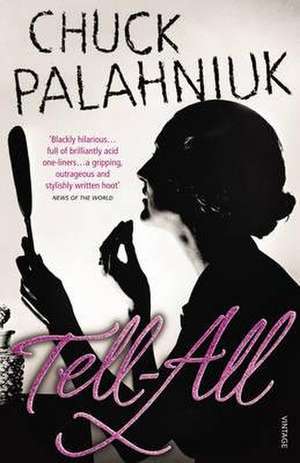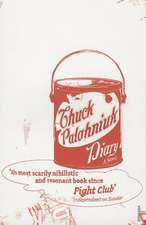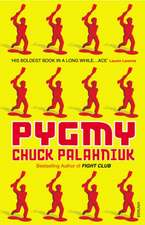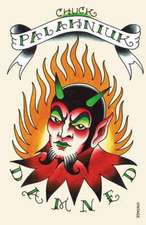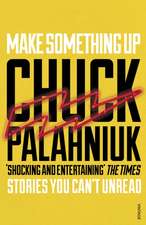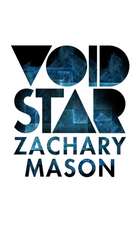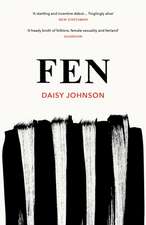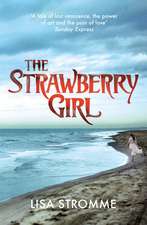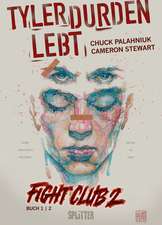Tell-All
Autor Chuck Palahniuken Limba Engleză Paperback – iun 2011
| Toate formatele și edițiile | Preț | Express |
|---|---|---|
| Paperback (2) | 80.91 lei 3-5 săpt. | +5.71 lei 6-12 zile |
| Vintage Publishing – iun 2011 | 80.91 lei 3-5 săpt. | +5.71 lei 6-12 zile |
| Anchor Books – 30 apr 2011 | 95.51 lei 6-8 săpt. |
Preț: 80.91 lei
Nou
Puncte Express: 121
Preț estimativ în valută:
15.48€ • 16.16$ • 12.81£
15.48€ • 16.16$ • 12.81£
Carte disponibilă
Livrare economică 14-28 martie
Livrare express 27 februarie-05 martie pentru 15.70 lei
Preluare comenzi: 021 569.72.76
Specificații
ISBN-13: 9780099526988
ISBN-10: 0099526980
Pagini: 192
Dimensiuni: 128 x 197 x 15 mm
Greutate: 0.14 kg
Editura: Vintage Publishing
ISBN-10: 0099526980
Pagini: 192
Dimensiuni: 128 x 197 x 15 mm
Greutate: 0.14 kg
Editura: Vintage Publishing
Notă biografică
Chuck Palahniuk’s ten previous novels are the bestselling Fight Club, which was made into a film by David Fincher; Survivor; Invisible Monsters; Choke, which was made into a film by director Clark Gregg; Lullaby; Diary; Haunted; Rant; Snuff; and Pygmy. He is also the author of Fugitives and Refugees, a nonfiction profile of Portland, Oregon, published as part of the Crown Journeys series, and the nonfiction collection Stranger Than Fiction. He lives in the Pacific Northwest.
Extras
ACT I, SCENE ONE
Act one, scene one opens with Lillian Hellman clawing her way, stumbling and scrambling, through the thorny nighttime underbrush of some German schwarzwald, a Jewish baby clamped to each of her tits, another brood of infants clinging to her back. Lilly clambers her way, struggling against the brambles that snag the gold embroidery of her Balenciaga lounging pajamas, the black velvet clutched by hordes of doomed cherubs she’s racing to deliver from the ovens of some Nazi death camp. More innocent toddlers, lashed to each of Lillian’s muscular thighs. Helpless Jewish, Gypsy and homosexual babies. Nazi gestapo bullets spit past her in the darkness, shredding the forest foliage, the smell of gunpowder and pine needles. The heady aroma of her Chanel No. 5. Bullets and hand grenades just whiz past Miss Hellman’s perfectly coiffed Hattie Carnegie chignon, so close the ammunition shatters her Cartier chandelier earrings into rainbow explosions of priceless diamonds. Ruby and emerald shrapnel blasts into the flawless skin of her perfect, pale cheeks. . . . From this action sequence, we dissolve to:
Reveal: the interior of a stately Sutton Place mansion. It’s some Billie Burke place decorated by Billy Haines, where formally dressed guests line a long table within a candlelit, wood-paneled dining room. Liveried footmen stand along the walls. Miss Hellman is seated near the head of this very large dinner party, actually describing the frantic escape scene we’ve just witnessed. In a slow panning shot, the engraved place cards denoting each guest read like a veritable Who’s Who. Easily half of twentieth-century history sits at this table: Prince Nicholas of Romania, Pablo Picasso, Cordell Hull and Josef von Sternberg. The attendant celebrities seem to stretch from Samuel Beckett to Gene Autry to Marjorie Main to the faraway horizon.
Lillian stops speaking long enough to draw one long drag on her cigarette. Then to blow the smoke over Pola Negri and Adolph Zukor before she says, “It’s at that heart-stopping moment I wished I’d just told Franklin Delano Roosevelt, ‘No, thank you.’ ” Lilly taps cigarette ash onto her bread plate, shaking her head, saying, “No secret missions for this girl.”
While the footmen pour wine and clear the sorbet dishes, Lillian’s hands swim through the air, her cigarette trailing smoke, her fingernails clawing at invisible forest vines, climbing sheer rock cliff faces, her high heels blazing a muddy trail toward freedom, her strength never yielding under the burden of those tiny Jewish and homosexual urchins.
Every eye, fixed, from the head of the table to the foot, stares at Lilly. Every hand crosses two fingers beneath the damask napkin laid in every lap, while every guest mouths a silent prayer that Miss Hellman will swallow her Chicken Prince Anatole Demidoff without chewing, then suffocate, writhing and choking on the dining room carpet.
Almost every eye. The exceptions being one pair of violet eyes . . . one pair of brown eyes . . . and of course my own weary eyes.
The possibility of dying before Lillian Hellman has become the tangible fear of this entire generation. Dying and becoming merely fodder for Lilly’s mouth. A person’s entire life and reputation reduced to some golem, a Frankenstein’s monster Miss Hellman can reanimate and manipulate to do her bidding.
Beyond her first few words, Lillian’s talk becomes one of those jungle sound tracks one hears looping in the background of every Tarzan film, just tropical birds and Johnny Weissmuller and howler monkeys repeating. Bark, bark, screech . . . Emerald Cunard. Bark, growl, screech . . . Cecil Beaton.
Lilly’s drivel possibly constitutes some bizarre form of name-dropping Tourette’s syndrome. Or perhaps the outcome of an orphaned press agent raised by wolves and taught to read aloud from Walter Winchell’s column.
Her compulsive prattle, a true pathology.
Cluck, oink, bark . . . Jean Negulesco.
Thus, Lilly spins the twenty-four-carat gold of people’s actual lives into her own brassy straw.
Please promise you did NOT hear this from me.
Seated within range of those flying heroic elbows, my Miss Kathie stares out from the bank of cigarette smoke. An actress of Katherine Kenton’s stature. Her violet eyes, trained throughout her adult life to never make contact with anything except the lens of a motion picture camera. To never meet the eyes of a stranger, instead to always focus on someone’s earlobe or lips. Despite such training, my Miss Kathie peers down the length of the table, her lashes fluttering. The slender fingers of one famous white hand toy with the auburn tresses of her wig. The jeweled fingers of Miss Kathie’s opposite hand touch the six strands of pearls which contain the loose folds of her sagging neck skin.
In the next instant, while the footmen pass the finger bowls, Lillian twists in her chair, shouldering an invisible sniper’s rifle and squeezing off rounds until the clip is empty. Still just dripping with Hebrew and Communist babies. Lugging her cargo of Semitic orphans. When the rifle is too searing hot to hold, Miss Hellman howls a wild war whoop and hurtles the steaming weapon at the pursuing storm troopers.
Snarl, bark, screech . . . Peter Lorre. Oink, bark, squeal . . . Averell Harriman.
It’s a fate worse than death to spend eternity in harness, serving as Lilly Hellman’s zombie, brought back to life at dinner parties. On radio talk programs. At this point, Miss Hellman is heaving yet another batch of invisible babies, rescued Gypsy babes, high, toward the chandelier, as if catapulting them over the snowcapped peak of the Matterhorn to the safety of Switzerland.
Grunt, howl, squeal . . . Sarah Bernhardt.
By now, Lillian Hellman wraps two fists around the invisible throat of Adolf Hitler, reenacting how she sneaked into his subterranean Berlin bunker, dressed as Leni Riefenstahl, her arms laden with black-market cartons of Lucky Strike and Parliament cigarettes, and then throttled the sleeping dictator in his bed.
Bray, bark, whinny . . . Basil Rathbone.
Lilly throws the terrified, make-believe Hitler into the center of tonight’s dinner table, her teeth biting, her manicured fingernails scratching at his Nazi eyes. Lillian’s fists clamped around the invisible windpipe, she begins pounding the invisible Führer’s skull against the tablecloth, making the silverware and wineglasses jump and rattle.
Screech, meow, tweet . . . Wallis Simpson.
Howl, bray, squeak . . . Diana Vreeland.
A moment before Hitler’s assassination, George Cukor looks up, his fingertips still dripping chilled water into his finger bowl, that smell of fresh-sliced lemons, and George says, “Please, Lillian.” Poor George says, “Would you please stuff it.”
Seated well below the salt, below the various professional hangers-on, the walking men, the drug dealers, the mesmerists, the exiled White Russians and poor Lorenz Hart, really at the very horizon of tonight’s dinner table, a young man looks back. Seated on the farthest frontier of placement. His eyes the bright brown of July Fourth sunlight through a tall mug of root beer. Quite the American specimen. A classic face of such symmetrical proportions, the exactly balanced type of face one dreams of looking down to find smiling and eager between one’s inner thighs.
Still, that’s the trouble with only a single glance at any star on the horizon. As Elsa Maxwell would say, “One can never tell for certain if that dazzling, shiny object is rising or setting.”
Lillian inhales the silence through her burning cigarette. Taps the gray ash onto her bread plate. In a blast of smoke, she says, “Did you hear?” She says, “It’s a fact, but Eleanor Roosevelt chewed every hair off my bush. . . .”
Through all of this—the cigarette smoke and lies and the Second World War—the specimen’s bright brown eyes, they’re looking straight down the table, up the social ladder, gazing back, deep, into the famous, fluttering violet eyes of my employer.
From the Paperback edition.
Act one, scene one opens with Lillian Hellman clawing her way, stumbling and scrambling, through the thorny nighttime underbrush of some German schwarzwald, a Jewish baby clamped to each of her tits, another brood of infants clinging to her back. Lilly clambers her way, struggling against the brambles that snag the gold embroidery of her Balenciaga lounging pajamas, the black velvet clutched by hordes of doomed cherubs she’s racing to deliver from the ovens of some Nazi death camp. More innocent toddlers, lashed to each of Lillian’s muscular thighs. Helpless Jewish, Gypsy and homosexual babies. Nazi gestapo bullets spit past her in the darkness, shredding the forest foliage, the smell of gunpowder and pine needles. The heady aroma of her Chanel No. 5. Bullets and hand grenades just whiz past Miss Hellman’s perfectly coiffed Hattie Carnegie chignon, so close the ammunition shatters her Cartier chandelier earrings into rainbow explosions of priceless diamonds. Ruby and emerald shrapnel blasts into the flawless skin of her perfect, pale cheeks. . . . From this action sequence, we dissolve to:
Reveal: the interior of a stately Sutton Place mansion. It’s some Billie Burke place decorated by Billy Haines, where formally dressed guests line a long table within a candlelit, wood-paneled dining room. Liveried footmen stand along the walls. Miss Hellman is seated near the head of this very large dinner party, actually describing the frantic escape scene we’ve just witnessed. In a slow panning shot, the engraved place cards denoting each guest read like a veritable Who’s Who. Easily half of twentieth-century history sits at this table: Prince Nicholas of Romania, Pablo Picasso, Cordell Hull and Josef von Sternberg. The attendant celebrities seem to stretch from Samuel Beckett to Gene Autry to Marjorie Main to the faraway horizon.
Lillian stops speaking long enough to draw one long drag on her cigarette. Then to blow the smoke over Pola Negri and Adolph Zukor before she says, “It’s at that heart-stopping moment I wished I’d just told Franklin Delano Roosevelt, ‘No, thank you.’ ” Lilly taps cigarette ash onto her bread plate, shaking her head, saying, “No secret missions for this girl.”
While the footmen pour wine and clear the sorbet dishes, Lillian’s hands swim through the air, her cigarette trailing smoke, her fingernails clawing at invisible forest vines, climbing sheer rock cliff faces, her high heels blazing a muddy trail toward freedom, her strength never yielding under the burden of those tiny Jewish and homosexual urchins.
Every eye, fixed, from the head of the table to the foot, stares at Lilly. Every hand crosses two fingers beneath the damask napkin laid in every lap, while every guest mouths a silent prayer that Miss Hellman will swallow her Chicken Prince Anatole Demidoff without chewing, then suffocate, writhing and choking on the dining room carpet.
Almost every eye. The exceptions being one pair of violet eyes . . . one pair of brown eyes . . . and of course my own weary eyes.
The possibility of dying before Lillian Hellman has become the tangible fear of this entire generation. Dying and becoming merely fodder for Lilly’s mouth. A person’s entire life and reputation reduced to some golem, a Frankenstein’s monster Miss Hellman can reanimate and manipulate to do her bidding.
Beyond her first few words, Lillian’s talk becomes one of those jungle sound tracks one hears looping in the background of every Tarzan film, just tropical birds and Johnny Weissmuller and howler monkeys repeating. Bark, bark, screech . . . Emerald Cunard. Bark, growl, screech . . . Cecil Beaton.
Lilly’s drivel possibly constitutes some bizarre form of name-dropping Tourette’s syndrome. Or perhaps the outcome of an orphaned press agent raised by wolves and taught to read aloud from Walter Winchell’s column.
Her compulsive prattle, a true pathology.
Cluck, oink, bark . . . Jean Negulesco.
Thus, Lilly spins the twenty-four-carat gold of people’s actual lives into her own brassy straw.
Please promise you did NOT hear this from me.
Seated within range of those flying heroic elbows, my Miss Kathie stares out from the bank of cigarette smoke. An actress of Katherine Kenton’s stature. Her violet eyes, trained throughout her adult life to never make contact with anything except the lens of a motion picture camera. To never meet the eyes of a stranger, instead to always focus on someone’s earlobe or lips. Despite such training, my Miss Kathie peers down the length of the table, her lashes fluttering. The slender fingers of one famous white hand toy with the auburn tresses of her wig. The jeweled fingers of Miss Kathie’s opposite hand touch the six strands of pearls which contain the loose folds of her sagging neck skin.
In the next instant, while the footmen pass the finger bowls, Lillian twists in her chair, shouldering an invisible sniper’s rifle and squeezing off rounds until the clip is empty. Still just dripping with Hebrew and Communist babies. Lugging her cargo of Semitic orphans. When the rifle is too searing hot to hold, Miss Hellman howls a wild war whoop and hurtles the steaming weapon at the pursuing storm troopers.
Snarl, bark, screech . . . Peter Lorre. Oink, bark, squeal . . . Averell Harriman.
It’s a fate worse than death to spend eternity in harness, serving as Lilly Hellman’s zombie, brought back to life at dinner parties. On radio talk programs. At this point, Miss Hellman is heaving yet another batch of invisible babies, rescued Gypsy babes, high, toward the chandelier, as if catapulting them over the snowcapped peak of the Matterhorn to the safety of Switzerland.
Grunt, howl, squeal . . . Sarah Bernhardt.
By now, Lillian Hellman wraps two fists around the invisible throat of Adolf Hitler, reenacting how she sneaked into his subterranean Berlin bunker, dressed as Leni Riefenstahl, her arms laden with black-market cartons of Lucky Strike and Parliament cigarettes, and then throttled the sleeping dictator in his bed.
Bray, bark, whinny . . . Basil Rathbone.
Lilly throws the terrified, make-believe Hitler into the center of tonight’s dinner table, her teeth biting, her manicured fingernails scratching at his Nazi eyes. Lillian’s fists clamped around the invisible windpipe, she begins pounding the invisible Führer’s skull against the tablecloth, making the silverware and wineglasses jump and rattle.
Screech, meow, tweet . . . Wallis Simpson.
Howl, bray, squeak . . . Diana Vreeland.
A moment before Hitler’s assassination, George Cukor looks up, his fingertips still dripping chilled water into his finger bowl, that smell of fresh-sliced lemons, and George says, “Please, Lillian.” Poor George says, “Would you please stuff it.”
Seated well below the salt, below the various professional hangers-on, the walking men, the drug dealers, the mesmerists, the exiled White Russians and poor Lorenz Hart, really at the very horizon of tonight’s dinner table, a young man looks back. Seated on the farthest frontier of placement. His eyes the bright brown of July Fourth sunlight through a tall mug of root beer. Quite the American specimen. A classic face of such symmetrical proportions, the exactly balanced type of face one dreams of looking down to find smiling and eager between one’s inner thighs.
Still, that’s the trouble with only a single glance at any star on the horizon. As Elsa Maxwell would say, “One can never tell for certain if that dazzling, shiny object is rising or setting.”
Lillian inhales the silence through her burning cigarette. Taps the gray ash onto her bread plate. In a blast of smoke, she says, “Did you hear?” She says, “It’s a fact, but Eleanor Roosevelt chewed every hair off my bush. . . .”
Through all of this—the cigarette smoke and lies and the Second World War—the specimen’s bright brown eyes, they’re looking straight down the table, up the social ladder, gazing back, deep, into the famous, fluttering violet eyes of my employer.
From the Paperback edition.
Recenzii
“Subtle as a straight right to the jaw, and just as bracing.” —Los Angeles Times
“Dreamlike, insane, Burroughs-esque.” —San Francisco Chronicle
“Over the top in Palahniuk’s patented style, made even richer by some athletic wordplay.” —The Oregonian
“Chuck Palahniuk is one of modern American fiction’s most interesting stylists, and he’s at it again. . . . A masterful feat.” —Associated Press
“With his love of contemporary fairy tales that are gritty and dirty rather than pretty, Palahniuk is the likeliest inheritor of Vonnegut’s place in American writing.” —San Francisco Chronicle
“Among sick puppies, Palahniuk is top dog.” —People
“Reading a Palahniuk novel is like getting zipped inside a boxer’s heavy bag while the author goes to work on you, pounding you until there is nothing left but a big bag of bones and blood and pain.” —The Miami Herald
“Palahniuk doesn’t write for tourists. He writes for hard-core devotees drawn to the wild, angry imagination on display and the taboo-busting humor.” —The New York Times
“So funny. . . . There are a lot of laughs to be had, notably from some outlandish Broadway productions of the playwright Lillian Hellman, and the excruciating extracts we read of Westward’s juicy and self-aggrandizing memoir, gloriously entitled Love Slave.” —The Independent (London)
“[Palahniuk] knows how to spin whacked-out stories particular to our times.” —The Seattle Times
“Chuck Palahniuk is William S. Burroughs and David Foster Wallace rolled into one.” —San Diego Union-Tribune
“Few contemporary writers mix the outrageous and the hilarious with greater zest. . . . Chuck Palahniuk’s splenetic, anarchic glee makes him a worthy heir to Ken Kesey.” —Newsday
“An author who continues to challenge and intrigue readers.” —The Boston Globe
“[Palahniuk] has a singular knack for coming up with inventive new ways to shock and degrade.” —New York Post
“Place this bet in your time capsule: Chuck Palahniuk’s novels will be required reading in American literature classes 100 years from now.” —The Fort Myers News-Press
“One of the most intriguing writers of our time.” —The Tucson Citizen
“Dreamlike, insane, Burroughs-esque.” —San Francisco Chronicle
“Over the top in Palahniuk’s patented style, made even richer by some athletic wordplay.” —The Oregonian
“Chuck Palahniuk is one of modern American fiction’s most interesting stylists, and he’s at it again. . . . A masterful feat.” —Associated Press
“With his love of contemporary fairy tales that are gritty and dirty rather than pretty, Palahniuk is the likeliest inheritor of Vonnegut’s place in American writing.” —San Francisco Chronicle
“Among sick puppies, Palahniuk is top dog.” —People
“Reading a Palahniuk novel is like getting zipped inside a boxer’s heavy bag while the author goes to work on you, pounding you until there is nothing left but a big bag of bones and blood and pain.” —The Miami Herald
“Palahniuk doesn’t write for tourists. He writes for hard-core devotees drawn to the wild, angry imagination on display and the taboo-busting humor.” —The New York Times
“So funny. . . . There are a lot of laughs to be had, notably from some outlandish Broadway productions of the playwright Lillian Hellman, and the excruciating extracts we read of Westward’s juicy and self-aggrandizing memoir, gloriously entitled Love Slave.” —The Independent (London)
“[Palahniuk] knows how to spin whacked-out stories particular to our times.” —The Seattle Times
“Chuck Palahniuk is William S. Burroughs and David Foster Wallace rolled into one.” —San Diego Union-Tribune
“Few contemporary writers mix the outrageous and the hilarious with greater zest. . . . Chuck Palahniuk’s splenetic, anarchic glee makes him a worthy heir to Ken Kesey.” —Newsday
“An author who continues to challenge and intrigue readers.” —The Boston Globe
“[Palahniuk] has a singular knack for coming up with inventive new ways to shock and degrade.” —New York Post
“Place this bet in your time capsule: Chuck Palahniuk’s novels will be required reading in American literature classes 100 years from now.” —The Fort Myers News-Press
“One of the most intriguing writers of our time.” —The Tucson Citizen
